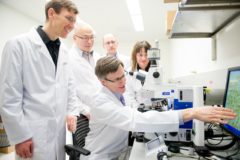GRAND RAPIDS, MI — A recently published journal article co-authored by Van Andel Institute scientist Dr. Patrik Brudin explores possible connections between COVID-19 and Parkinson’s disease.
Can COVID-19 infection increase the risk of developing Parkinson’s disease? That’s the question posed in the piece in Trends in Neurosciences. Three known case studies of people developing Parkinson’s-like symptoms in the weeks following their infection with SARS-CoV-2, the virus that causes COVID-19, are explored.
While rare, these cases are said to provide important insights into potential long-term implications of infections.
“As we continue to grapple with the COVID-19 pandemic today, we also must consider its implications for the future,” said Brundin, associate director of research at VAI, in a press release from the institute.
“Evidence is mounting that the side effects of COVID-19 infection, such as inflammation and damage to the vascular system, could lay the foundation for development of Parkinson’s disease. COVID-19 is clearly a major and ongoing public health threat, but the consequences of infection may end up being with us for years and decades to come.”
The other co-authors of the article are Dr. Avindra Nath of the National Institute of Neurological Disorders and Stroke of the National Institutes of Health, and Dr. J. David Beckham of University of Colorado.
Viral infections in particular may play a role in triggering the earliest stages of Parkinson’s by setting off a cascade that results in the death of brain cells that produce dopamine, a vital chemical messenger whose absence leads to movement issues such as freezing and tremor.
The three cases referenced in the commentary occurred in people without a family history of Parkinson’s and without any known early Parkinson’s symptoms. Two saw an improvement in their symptoms following treatment with medications that replenish dopamine; the third recovered spontaneously.
Although these medications treat symptoms, they reportedly often have challenging side effects and do not slow or stop the disease’s progression.
“SARS-CoV-2 is considered a respiratory virus, however, its virulence and pathogenic potential particularly for neurological complications continues to surprise us,” Nath said. “Some patients can develop severe neurological manifestations despite mild respiratory symptoms.”
Based on evidence from the case studies and what is known about the mechanisms underpinning Parkinson’s, the co-authors of the study suggest three possible ways that COVID-19 infection could contribute to Parkinson’s onset:
- COVID-19 is linked to blood clots and other vascular system issues, including in the brain. This could cause damage to the area of the brain that produces dopamine, which could result in a loss of dopamine that mirrors Parkinson’s.
- There is a demonstrated link between chronic inflammation and Parkinson’s. It is possible that severe inflammation resulting from COVID-19 could trigger brain inflammation and cell death associated with Parkinson’s.
- SARS-CoV-2 may be a neurotropic virus, meaning it attacks the nervous system. Because of this, COVID-19 and Parkinson’s share some early symptoms such as loss of sense of smell and issues with the gut. Additionally, infection with SARS-CoV-2 could lead to an increase in alpha-synuclein, a protein associated with Parkinson’s also seen in other viral infections.
Although these cases do not prove that COVID-19 infection causes Parkinson’s, they do suggest a troubling possible relationship between the virus and subsequent neurodegenerative disorders, according to the news release.
“The large number of respiratory cases due to SARS-CoV2 has allowed us to understand and analyze important neurologic complications of severe respiratory virus infections,” Beckham said.
“It is important that we continue our scientific investigations into this new virus so we understand all of the short and long-term complications of the COVID-19 pandemic.”
Going forward, the authors call for long-term studies that follow people who were infected with COVID-19 to monitor them for Parkinson’s development.


